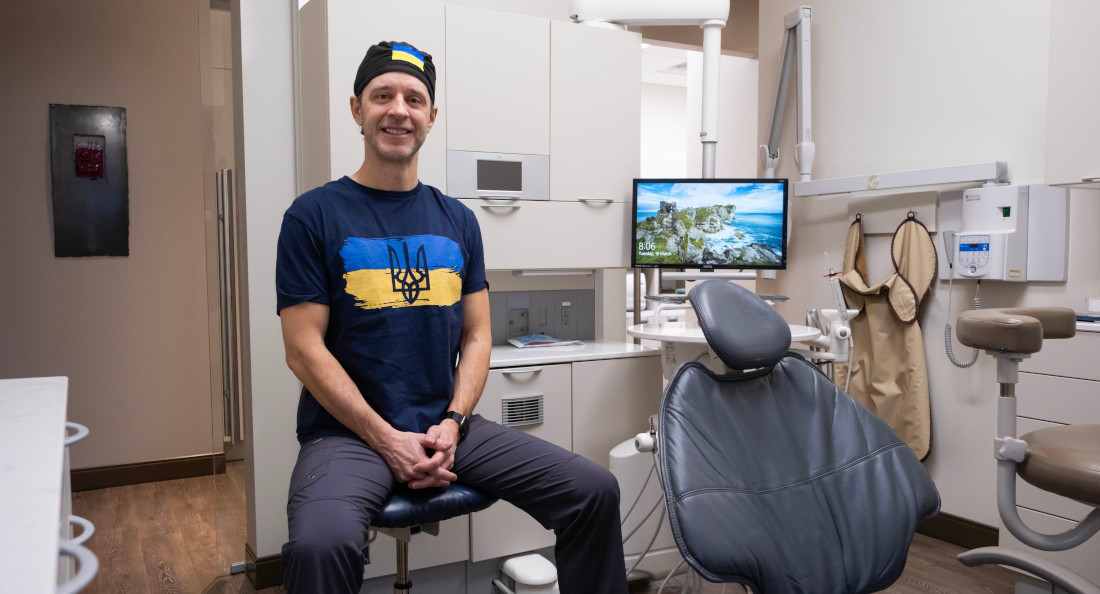Overcoming language barriers for refugees
Community support key for newcomers accessing dentistry, basic services
For many Winnipeggers, it’s easy to take basic services for granted. Relationships with one-on-one service providers like dentists, doctors or barbers are personal and often develop over the course of years. But for the city’s many newcomer refugees, there’s a significant barrier to accessing these services: language.
Since Russia’s full-scale invasion of Ukraine began in February 2022, more than 24,000 Ukrainians have taken refuge in Manitoba. Online community message boards like the r/Winnipeg subreddit, Nextdoor and Mutual Aid Society Winnipeg frequently feature posts from locals trying to help Ukrainian friends, family and neighbours find professionals who speak their language.
Dr. Zdan Shulakewych is a dentist at Images Dental Centre. A first-generation Canadian, Shulakewych grew up speaking Ukrainian at home and provides Ukrainian-language dental services. He says that more than 100 of his patients are Ukrainian refugees.
“Some of the patients speak no English at all,” he says. “A lot of them are stunned that I speak (fluent Ukrainian). But that’s still what I speak with my parents at home ... It’s funny, some of these patients come in, they start speaking in (English or Russian). I start speaking Ukrainian to them, and it’s like a light flips on. They’re so overcome that I’m speaking in Ukrainian.”
The Manitoba Dental Association (MDA) has a searchable database where users can search for providers based on language. But Shulakewych has also relied on word of mouth to inform newcomers about these services.
“My clinic has been advertised on Instagram and Telegram (as providing Ukrainian-lan- guage services), and people speak amongst themselves in the community, and some refugees come into the practice,” he says.
Joan Lewandosky is the president of the Ukrainian Canadian Congress’ (UCC) Manitoba Provincial Council. The UCC is a Ukrainian-Canadian community organization that has provided a wide array of resources to Ukrainian newcomers, including financial and material aid. Lewandosky says the community response, which has been key to filling the gaps in resources, is part of why so many Ukrainians have come to Manitoba.
“They feel that this is a welcoming place,” she says. “There’s a (large Ukrainian diaspora) here.”
Lewandosky says contributions from other ethnocultural communities have provided crucial support, citing a multimillion-dollar program by the Manitoba Métis Federation to train Ukrainian refugees as early childhood educators.
“(The local French community) has given us $100,000,” she says. “Money has come from the Italian, Polish and Sudanese communities, just to name a few ... Manitobans have been extremely generous. They’ve opened their hearts, homes and wallets.”
Shulakewych says his office has hired two refugees who worked in dentistry in Ukraine and Poland to work as receptionists, which has helped with translation. He’s also offered services on a sliding payment scale for those who don’t have dental coverage.
While many newcomers have access to employer-based dental coverage, those who don’t remain in an awkward limbo. Dr. Daron Baxter, president of the MDA, says the federal government provides emergency dental coverage for refugees, but Ukrainians fleeing the war technically don’t have refugee status in Canada.
The MDA’s philanthropic arm, the Manitoba Dental Foundation, donated several thousands of dollars to the UCC for dental coverage, but Lewandosky says the funds have been exhausted.
“The dentists have been very accommodating (since the funds expired),” she says. “(Many) aren’t charging for their work, just for materials.”
Published in Volume 78, Number 22 of The Uniter (March 21, 2024)








